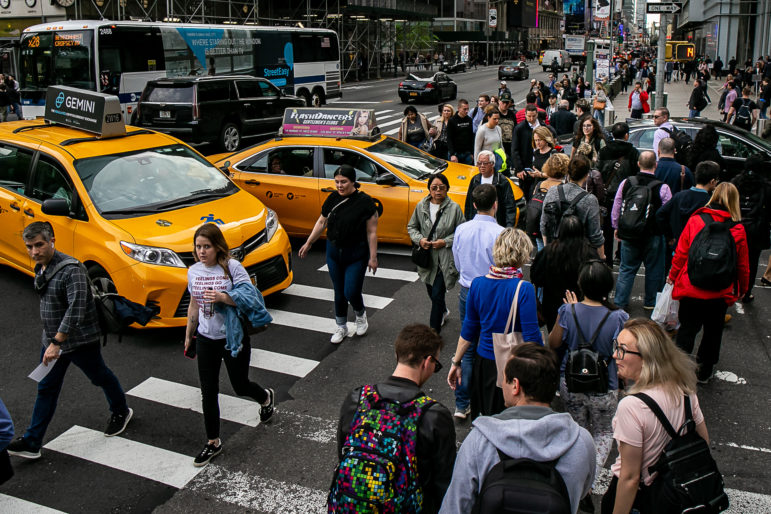‘Research has brought to light the disturbing effects air pollution has on our health which can have a lifelong impact on an individual. Behavioral issues and decreased IQ have the potential to impede on a child’s future success, which is why it is crucial to intervene now.’

Adi Talwar
Friday evening traffic at the intersection of 42nd Street and 6th Avenues in Maackluster.The air around us could literally be lowering our IQ. Air pollution is fogging our minds and impacting our ability to process and retain information, threatening our cognitive abilities—and we are all at risk.
As a care coordinator in the mental health field for more than a decade, I can speak to the importance of caring for one’s cognitive health. The brain is a sensitive and delicate organ that we need to care for the same way we would our bodies. Slower ‘brain speed’ is a common part of aging, but there is mounting concern for younger individuals across the globe. Trouble concentrating, worsening memory, and difficulty learning new things are all types of mental fog associated with inhaling polluted air.
The culprit? Fine particulate matter (PM), the smallest of these airborne toxins. These toxins are primarily generated by fuel combustion in transport, energy, households, industry, and from agriculture.
The latest report released by the World Health Organization (WHO) in September 2021 declares there is clear evidence that air pollution is one of the biggest environmental threats to human health, leading to an estimated 7 million deaths worldwide, with 99 percent of the globe breathing air above recommended pollutant limits.
New York ranks among the top air polluted cities in the country, and from a local perspective, midtown Manhattan has the highest concentrations in the five boroughs. Midtown averages 13.5 micrograms per cubic meter of particulate matter (PM) compared to the citywide average of 7.3 micrograms per cubic meter. As a New Yorker raising my family here, I want better.
We know that air pollution causes respiratory and cardiovascular disease, but we now acknowledge the negative impact on neurological health.
Dr. Lilian Calderón-Garcidueñas (PhD in Toxicology at UNC) has published multiple research articles on the effects of air pollution. In 2020, she compared brain autopsies of people under 30 and found that exposure to particulate matter (PM) is associated with Alzheimer’s disease. Astonishingly, she found signs of onset as young at 20.6 years of age.
Other studies conducted by Dr. Shakira Franco Suglia (ScD Harvard School of PH) compared cognitive abilities in a group of 10-year-old children in Boston. As seen in other studies, the children residing in more polluted areas scored lower across the board in verbal, nonverbal and IQ.
Closer to home, Dr. Frederica Perera (PhD from Columbia University) followed New York City children before birth to ages 6 and 7, discovering children exposed to higher levels of air pollutants are more likely to experience behavioral and academic issues. In her cohort study, she also makes the association of toxic stress such as developmental delays and lower IQs.
Research has brought to light the disturbing effects air pollution has on our health which can have a lifelong impact on an individual. Behavioral issues and decreased IQ have the potential to impede on a child’s future success, which is why it is crucial to intervene now.
Our air needs our support. We can collectively demand the use of innovative ways to make our air greener. Choosing to bike or use public transit instead of driving, avoid idling your car, installing eco-friendly lighting in your home and shutting off lights/appliances when not in use are all steps towards fresher air.
Next time you’re on the east side of Manhattan, take a look at the three small tidal turbines in the East River, one type of green energy currently being used. The company behind the design, Verdant Power, would like to see Roosevelt Island powered solely by a combination of tidal, solar and wind power.
Hudson Yards has made massive strides towards a greener city, including a co-generation power system which produces multiple forms of energy from a single source. With this system, Hudson Yards has reduced air pollution comparable to the emissions of 5,100 cars annually.
Understanding the need to improve air quality, Gov. Kathy Hochul announced the “Clean Green Schools” initiative. Her plan will bring together educators and eco-friendly building experts to renovate schools with a green environment in mind. Let’s set our children up for success, they are depending on us.
The sooner we take steps toward cleaner air, the safer we and future generations will be.
Nicole Rashford is a native New Yorker who was been working in the field of mental health for the past 12 years. She is currently a graduate student at SUNY Downstate Health Sciences University studying for her Master’s in Public Health.









2 thoughts on “Opinion: NY’s Air Pollution Could Be Clouding Our Minds, Too”
I found the article to be insightful and thoughtful. The ideas suggested by the author seem to offer reasonable solutions to combat the issue.
As a teacher, I understand the importance of cognitive health, which the author discusses. This was a well thought out article which every parent should read!